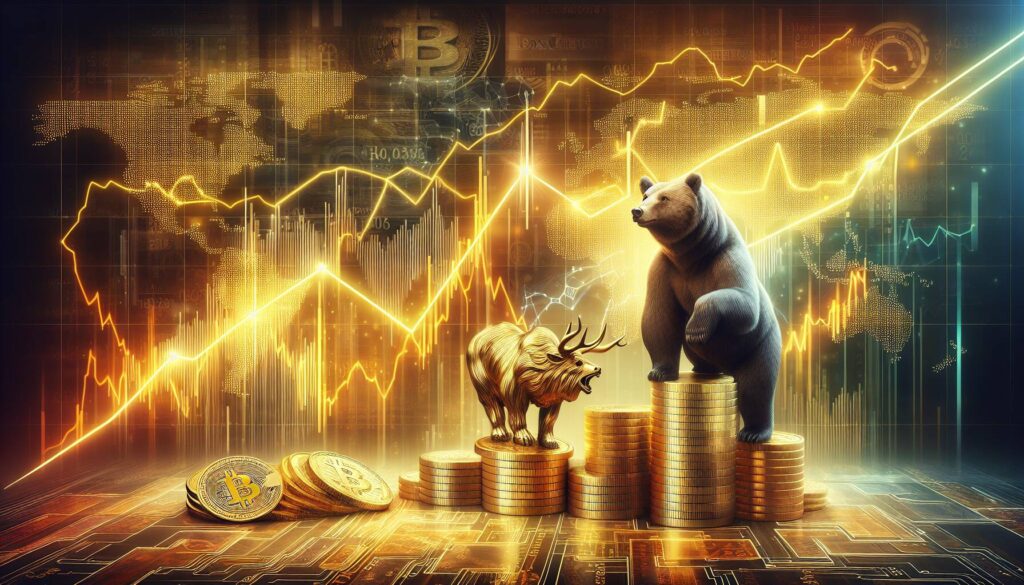The cryptocurrency market is facing a turbulent week amid escalating trade tensions and upcoming economic reports. International stock markets, particularly in Asia and Europe, are seeing sharp declines, with Japan’s Nikkei 225 plunging over 4% into correction territory. This bearish trend is attributed to President Donald Trump’s impending announcement of new tariffs, which he has branded as “Liberation Day.” The tariffs are aimed at countries with unfair trade practices against the U.S., although potential concessions for certain nations are suggested.
Financial uncertainty is reflected in the U.S. market as well. Following unexpected increases in core inflation figures, U.S. equities witnessed a drop, intensifying concerns ahead of the Friday jobs report, which anticipates a rise in unemployment. As economic pressures mount, gold has surged to record prices, surpassing ,100 per ounce.
On the cryptocurrency front, Bitcoin (BTC) is struggling to maintain its position above ,000, down approximately 12% for the quarter. Ethereum (ETH) is facing an even harsher downturn, with a staggering 46% decline since the start of the year, dropping its value significantly against Bitcoin. This poor performance from major cryptocurrencies has provoked concerns about the broader digital asset market, which is bracing for the implications of fluctuating economic indicators and trade policies.
“The upcoming tariff announcements and the March jobs report are likely to influence market sentiment significantly,” analysts warn.
As traders watch potential pivotal developments, several significant updates are on the horizon for the crypto sector, including testnet launches and claims processes for affected users of the collapsing Terra ecosystem. Furthermore, trading activity continues on decentralized platforms like Pump.fun’s PumpSwap, notably successful within the Solana ecosystem, even as overall activity shows signs of cooling.
Investors remain attentive to a mix of macroeconomic updates and ongoing legislative discussions around cryptocurrency regulations, all of which could impact market dynamics in the near future.

Impact of Global Financial Trends
This article presents several key points regarding the current state of global financial markets, highlighting potential impacts on everyday life and investment strategies.
- Trade Tensions Escalate:
- Asian and European stocks decline due to President Trump’s new tariffs.
- Markets reacted negatively, indicating investors’ concerns over economic stability.
- U.S. Economic Indicators:
- Upcoming jobs report may show rising unemployment and lower payroll growth.
- High inflation readings contribute to market uncertainty, affecting consumer confidence and spending.
- Market Reaction to Inflation:
- Gold prices surge, showcasing a shift towards safe-haven assets amidst uncertainty.
- Cryptocurrencies like bitcoin and ether experience significant declines, impacting individual investors relying on these assets.
- Tariff Announcement Scheduled:
- Trump’s tariffs may broadly affect international trade relations, leading to potential price increases on imported goods.
- Individuals may see direct impacts on prices in areas ranging from consumer electronics to automobiles.
- Crypto Market Volatility:
- Bitcoin and ether’s sharp declines could affect investors’ portfolios and market perceptions.
- Ether’s struggles may signal broader issues within the cryptocurrency space, prompting investors to reconsider their strategies.
- Upcoming Economic Data Releases:
- Market participants are keenly awaiting key economic releases, which could influence policy and market conditions.
- Anyone involved in stock or cryptocurrency trading should stay informed to make timely investment decisions.
These financial trends highlight the interconnectedness of global markets and the potential for economic policies implemented by governments to reach individuals in diverse ways.
Market Turbulence: Comparing Financial Struggles Amid Tariff Threats
The current financial news landscape is increasingly dominated by uncertainties stemming from escalating trade tensions, as evidenced by steep declines in both Asian and European stock markets. Recent reports indicate that the Japanese Nikkei 225 is in correction territory, reflecting a broader trend of investors retreating amidst fears of imminent tariffs set to be announced by President Trump, creating a ripple effect across global economies. This volatility presents a dual narrative: while some markets suffer, others like gold have seen a substantial rally—surpassing historic price points—capturing the attention of investors seeking safe havens.
One major advantage for precious metals, particularly gold, is its traditional role as a safeguard during economic instability. As market analysts observe a surge in gold prices surpassing ,100 per ounce, it paints a contrasting picture from the cryptocurrency space, particularly bitcoin and ether, both facing significant downturns. Bitcoin recently hovered around ,000, down 12% for the quarter, while ether has faced a dramatic slump of almost 46%. In this light, gold’s allure as a stable asset is more pronounced, especially for risk-averse investors or those with long positions that are now heavily underwater.
However, the volatility in the stock and crypto markets raises important questions. The anxiety surrounding the forthcoming tariffs and inflation data could deter long-term investments, particularly in equities. Industries tied to international trade, like automotive and technology, may find themselves particularly vulnerable as new levies threaten profit margins. Businesses reliant on these sectors could face serious operational challenges, potentially leading to job losses, which would exacerbate the already expected rise in unemployment rates.
Cryptocurrency enthusiasts may see these turbulent times as an opportunity to buy in at lower prices; however, with bitcoin and ether grappling with their respective declines, investors need to tread carefully. The continued uncertainty could also discourage new investors from entering the space. Additionally, the looming inflation and potential job market downturn may create a more adverse environment, especially for sectors closely linked to consumer spending and investment in tech-driven solutions.
In summary, while gold and traditional markets appear to be reacting positively to current economic headwinds, the same cannot be said for cryptocurrencies and certain equity sectors. This scenario will likely benefit investors seeking safe-haven assets while posing significant challenges for those heavily invested in tech and international trade sectors. As market watchers brace for upcoming economic indicators, these dynamics warrant close attention and strategic adjustments from stakeholders across the board.















